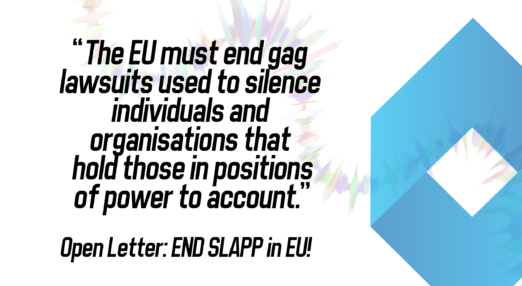Freedom to publish
Filter by...
-

Open Letter: ending gag lawsuits in Europe – protecting democracy and fundamental rights
The European Digital Rights network joined 118 civil society organisations from across the globe in signing an open letter (the latest act of a longstanding movement) addressing the need to end gag lawsuits that threaten the public interest by allowing powerful actors to silence those that would speak against them.
Read more
-
FBI was controlling servers located in France
The FBI admitted on 12 September 2013 that, in late July, it had secretly taken control of some servers located in France in order to plant a malware within a police action. The agency has introduced the spyware on web pages hosted by Freedom Hosting, meant for Tor anonymization network. The hoster had been exposed since 2011 by activists […]
Read more
-
WCIT: what happened and what it means for the Internet
This article is also available in: Deutsch: [WCIT: Was passiert ist und was es für das Internet bedeutet | https://www.unwatched.org/EDRigram_10.24_WCIT_Was_passiert_ist_und_was_es_fuer_das_Internet_bedeutet?pk_campaign=edri&pk_kwd=20121219] After two weeks of intensive negotiations, the World Conference on International Telecommunications (WCIT) adopted the revised International Telecommunications Regulations (ITRs), a controversial treaty, which has been viewed by many as an attempt by the International […]
Read more
-
ENDitorial: The ETNO's WCIT proposals are not as bad as some say
This article is also available in: Deutsch: [ENDitorial: Der WCIT-Vorschlag der ETNO ist nicht so schlimm wie manche sagen | https://www.unwatched.org/EDRigram_10.19_ENDitorial_Der_WCIT-Vorschlag_der_ETNO_ist_nicht_so_schlimm_wie_manche_sagen?pk_campaign=edri&pk_kwd=20121010] Many people have criticised the ETNO’s proposals for the World Conference on International Telecommunications (WCIT), arguing that these would significantly damage net neutrality. These criticisms are not entirely correct – because ETNO’s proposals are […]
Read more
-
Some governments want more control over the Internet via ITU
There has lately been controversy over proposals made by several countries, such as Russia and China, to give more control over the Internet to the UN International Telecommunications Union (ITU). Key functions of the internet as naming, numbering, addressing and identification are now carried out by ICANN, based in the US independent IANA, and national […]
Read more
-
New CoE recommendations for human rights in Internet services
This article is also available in: Deutsch: [Neue Empfehlungen des Europarats zur Wahrung der Menschenrechte im Internet | https://www.unwatched.org/EDRigram_10.7_Neue_Empfehlungen_des_Europarats_zur_Wahrung_der_Menschenrechte_im_Internet?pk_campaign=edri&pk_kwd=20120411] On 4 April 2012, the Council of Europe adopted two recommendations made by the Committee of Ministers related to the protection of human rights, particularly the freedom of expression, freedom of association, access to information and […]
Read more
-
CoE's Internet Governance strategy places emphasis on users' rights
This article is also available in: Deutsch: [Internet Governance: Europarat will Rechte der Internetnutzer stärken | https://www.unwatched.org/EDRigram_10.6_Internet_Governance_Europarat_will_Rechte_der_Internetnutzer_staerken?pk_campaign=edri&pk_kwd=20120328] On 15 March 2012, the 47 Council of Europe (CoE) member states adopted an Internet governance strategy to protect and promote human rights, the rule of law and pluralistic democracy online. The strategy, which covers 40 lines of […]
Read more
-
Internet governance dialogue in Belgrade 2011
This article is also available in: Deutsch: [Internet Governance Dialog 2011 in Belgrad | http://bit.ly/mpzbht] The 4th European Dialogue on Internet Governance (EuroDIG) took place in Belgrade on 30-31 May 2011 covering a lot of debates on a large area of issues on concepts of Internet Governance, from freedom of expression to privacy and cybersecurity. […]
Read more
-
Ten Internet Rights & Principles for Human Rights and Social Justice
This article is also available in: Deutsch: [10 Rechte und Prinzipien für das Internet | http://www.unwatched.org/EDRigram_9.7_Zehn_Internetrechte_und_Prinzipien] The Internet Rights and Principles Dynamic Coalition (DC-IRP) launched on 31 March 2011 its “10 Internet Rights and Principles” for an Internet governance rooted in human rights and social justice. These 10 Internet Rights and Principles are part of […]
Read more
-
EP Culture Committee – Draft Internet Governance Opinion published
This article is also available in: Deutsch: [Kulturausschuss des Europäischen Parlaments – Gutachtenentwurf zu Internet Governance veröffentlicht | http://www.unwatched.org/node/1681] The European Parliament (EP) has started its deliberations on a non-binding report on “Internet governance, the next steps”, following the Commission’s Communication on this topic in 2009. The draft Opinion of the European Parliament’s Culture Committee […]
Read more
-
Finland: Introducing Internet broadband as a universal service
This article is also available in: Deutsch: [Finnland: Breitbandinternet als ein Allgemeindienst eingeführt | http://www.unwatched.org/node/1559] According to a decree issued by the Finish Ministry of Transport and Communications, starting with 1 July 2010, a 1 Mbit Internet connection will be defined as a requirement of the Universal Service. Thus, Finland becomes the first country in […]
Read more
-
Britain takes another step toward a new Bill of Rights
(Dieser Artikel ist auch in deutscher Sprache verfügbar) The London School of Economics has commenced a project to help pave the way for strengthened constitutional rights in Britain. The initiative is to be conducted over the next two years by the School’s newly formed Policy Engagement Research Group that was founded earlier this year by […]
Read more
